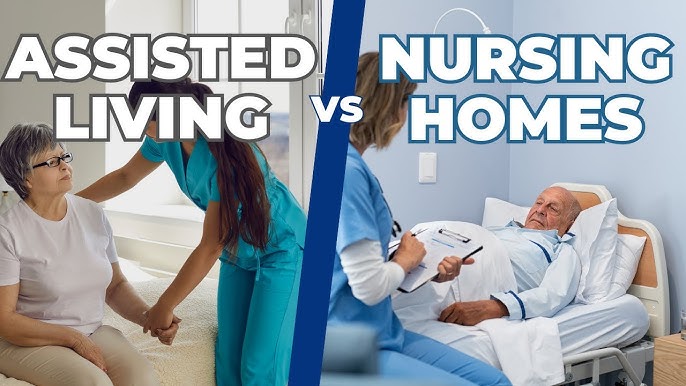In today’s aging society, Senior Living vs. Nursing Homes, each with specific features and services to accommodate various needs. Two popular options are senior living communities and nursing homes. While both provide a safe and supportive environment for older adults, the two differ significantly in terms of services, cost, level of independence, and the type of care provided. Choosing between senior living and a nursing home requires understanding these differences and assessing what best aligns with the individual’s physical, emotional, and financial needs. In this article, we’ll explore the unique characteristics, advantages, and limitations of each to help families make informed decisions.
Understanding Senior Living Communities
Senior living is a broad term that includes various types of residential arrangements tailored for older adults. Within senior living, there are multiple levels of care and independence, making it suitable for seniors with different needs and preferences. Here are some of the most common forms of senior living:
- Independent Living: Ideal for healthy, active seniors, independent living communities provide a social and convenient lifestyle without the burdens of home maintenance. They offer amenities like meal plans, housekeeping, recreational activities, and access to a community of peers. However, medical care is typically not included, so these facilities are suited for those who can live independently.
- Assisted Living: Assisted living communities provide a blend of independence and support, making them perfect for seniors who need some assistance with daily activities, such as dressing, bathing, or medication management. Residents have private or semi-private apartments, with access to social events and basic medical monitoring. This option balances a relatively high degree of independence with the security of knowing help is available if needed.
- Memory Care: This is a specialized type of assisted living for seniors with dementia or Alzheimer’s disease. Memory care communities offer 24/7 supervision, structured activities, and trained staff to meet the unique needs of residents with cognitive impairments.
- Continuing Care Retirement Communities (CCRCs): CCRCs offer a combination of independent living, assisted living, and skilled nursing care, allowing residents to “age in place.” This means that as a resident’s needs change over time, they can transition to different levels of care within the same community.
Benefits of Senior Living Communities
The primary appeal of senior living communities lies in the quality of life they offer. These communities aim to foster independence, socialization, and convenience in a supportive environment.
- Independence: Senior living communities allow residents to retain a high degree of independence. Those in independent living, for instance, can maintain their own schedule, pursue hobbies, and interact freely with peers, helping them lead an active and fulfilling life.
- Social Opportunities: With organized activities, outings, and events, senior living communities provide ample opportunities for social interaction, which can reduce loneliness and improve mental well-being.
- Access to Amenities: Senior living communities often feature amenities like gyms, swimming pools, dining areas, and even libraries or beauty salons, making life convenient and enjoyable for residents.
- Flexible Support: Assisted living communities are particularly beneficial because they provide assistance only when needed, allowing residents to stay independent while having access to help when necessary.
- Cost-Effective Options: Depending on the level of care, senior living communities can be more cost-effective than nursing homes, especially for those who do not need round-the-clock medical care.
Nursing Homes: Comprehensive Medical and Personal Care
Nursing homes, also known as skilled nursing facilities, provide a higher level of medical care than senior living communities. They are designed for individuals who require extensive medical supervision and assistance with daily activities. Nursing homes are equipped with licensed nurses, medical personnel, and sometimes physicians on-site to ensure comprehensive care for residents.
This option is most suitable for seniors with chronic health conditions, those recovering from surgery, or individuals who are bedridden and need 24/7 care. Nursing homes are regulated by federal and state authorities, meaning they must meet specific standards for quality and safety.
Key Features of Nursing Homes
- Medical Supervision: Unlike senior living, nursing homes provide intensive medical care and supervision. Nurses are available around the clock, and physicians may be on call or visit regularly to manage residents’ health needs.
- Rehabilitation Services: Nursing homes often provide rehabilitation services, including physical therapy, occupational therapy, and speech therapy, making them ideal for individuals recovering from a stroke, surgery, or other significant health events.
- Daily Care: Nursing homes assist with all aspects of personal care, including bathing, dressing, eating, and medication administration. For residents who require constant assistance, this level of care is essential.
- Secure Environment: Many nursing homes have secure units for residents with dementia, similar to memory care in senior living, but with more intensive medical oversight. This is particularly beneficial for seniors at risk of wandering or those requiring close monitoring.
- Specialized Diets and Meal Plans: Due to the high level of medical oversight, nursing homes can accommodate specialized diets and monitor nutrition closely, which is essential for residents with specific health conditions or dietary restrictions.
Choosing Between Senior Living and Nursing Homes: Factors to Consider
When deciding between senior living and nursing homes, it’s crucial to assess a few key factors:
- Level of Independence: For seniors who are still active and enjoy a high degree of independence, senior living is generally more suitable. However, those with significant medical needs may benefit more from the care provided in a nursing home.
- Health Needs: Seniors with complex or chronic medical issues that require constant supervision or specialized care (such as feeding tubes, ventilators, or advanced wound care) are better suited for nursing homes.
- Social Needs: Senior living communities often provide a more social atmosphere with a range of group activities and outings. Senior Living vs. Nursing Homes may also offer social activities, but the focus is more on medical care than community engagement.
- Budget: Cost is a significant factor. Senior living communities, particularly independent or assisted living, are generally less expensive than nursing homes. However, it’s important to evaluate all costs, including potential medical expenses, to determine the most affordable option.
- Future Care Needs: For families concerned about the possibility of a senior’s health deteriorating, continuing care retirement communities can offer peace of mind by allowing the senior to stay in one place as they progress through different levels of care.
Cost Comparison
The cost difference between senior living and nursing homes is considerable. Assisted living communities typically cost less, as they do not provide extensive medical care. According to data from Genworth’s Cost of Care Survey, the average monthly cost of assisted living in the United States is around $4,500, while nursing home care can range from $7,500 to over $9,000, depending on the level of care and location.
These costs can be covered through various means, such as private pay, long-term care insurance, or Medicaid (for nursing home care in certain cases). Medicare, however, generally does not cover assisted living or long-term nursing home stays, though it may pay for short-term rehabilitation in a skilled nursing facility.
Final Thoughts: Finding the Right Fit
Choosing between senior living and a nursing home is a significant decision that depends on individual needs, health status, budget, and personal preferences. Senior living communities are ideal for those who value independence, social opportunities, and a supportive but less intensive environment. In contrast, nursing homes are the right choice for individuals who require comprehensive medical care and support with daily activities.
Families are encouraged to visit facilities, ask questions, and review the services and amenities offered before making a final decision. By understanding the distinctions between these options and carefully considering the needs of their loved one, families can make a choice that enhances quality of life and provides peace of mind.


